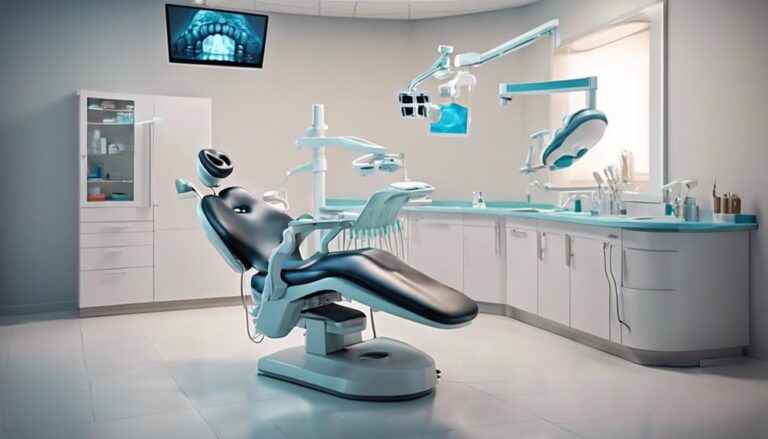Psychiatric Nurse Job Description
As a psychiatric nurse, you assess mental health, provide therapeutic support, and conduct evaluations for precise care planning. You play an essential role in crisis intervention, medication management, and communication strategies to enhance patient care. Your educational background includes a Bachelor's Degree in Nursing and specialized training in psychiatric care. Licensing and certification are crucial for showcasing your expertise. In diverse settings like inpatient units and outpatient clinics, you collaborate with interdisciplinary teams to guarantee holistic treatment. Opportunities for career growth, skill expansion, and salary increase await you in this rewarding field. Enhance your impact in mental health care.
Key Takeaways
- Assess and monitor mental health status of patients for accurate care planning.
- Provide therapeutic communication and support in high-stress situations.
- Administer medications, manage side effects, and enhance patient care.
- Collaborate with interdisciplinary teams for holistic treatment plans.
- Gain clinical experience, specialized training, and necessary licensing for expertise.
Job Responsibilities
As a psychiatric nurse, you'll consistently assess and monitor the mental health status of patients under your care. Your role in mental health interventions is essential, providing therapeutic communication to support patients in their recovery journey. Through empathetic listening and understanding, you create a safe space for patients to express their feelings and concerns.
Crisis management is another pivotal aspect of your job responsibilities. You must be prepared to handle high-stress situations with professionalism and efficiency. Your training in psychiatric assessments equips you to evaluate patients' mental health needs accurately and develop appropriate care plans tailored to each individual.
Your attention to detail is paramount in observing and documenting patients' progress, behaviors, and responses to treatment. By maintaining detailed records, you contribute valuable information to the healthcare team, ensuring continuity of care. Your compassionate approach and dedication to improving the lives of those struggling with mental health challenges make you an indispensable asset in the field of psychiatric nursing.
Required Skills
As a psychiatric nurse, your essential nursing skills and patient interaction techniques are vital in providing holistic care to individuals in need. Your ability to assess, communicate effectively, and show empathy towards patients will make a significant impact on their mental health journey.
These skills won't only enhance your clinical practice but also contribute to creating a safe and supportive environment for those seeking psychiatric care.
Essential Nursing Skills
Developing a strong foundation of essential nursing skills is important for excelling in the role of a psychiatric nurse. Crisis intervention skills are essential for handling emergencies and supporting patients in distress effectively.
As a psychiatric nurse, you must be adept at managing medications, ensuring patients receive the correct dosages and monitoring for any side effects. Proficiency in medication management is necessary to provide safe and effective care to individuals with mental health conditions.
Being detail-oriented in administering medications and documenting their effects is key to promoting the well-being of your patients. By honing your crisis intervention and medication management skills, you can make a significant difference in the lives of those under your care.
Patient Interaction Techniques
Improving your patient interaction techniques is essential for fostering a supportive and empathetic environment as a psychiatric nurse. Communication strategies play an important role in developing therapeutic rapport with patients. Active listening techniques help you understand their needs and concerns better. Establishing clear boundaries in patient care is also important to maintain a professional relationship while showing empathy. Here is a table summarizing key patient interaction techniques:
| Patient Interaction Techniques | Description | Benefits |
|---|---|---|
| Communication strategies | Effective ways to engage with patients | Enhances understanding and trust. |
| Boundaries in patient care | Setting limits to maintain professionalism | Ensures ethical and respectful interactions. |
| Therapeutic rapport | Building a trusting relationship | Facilitates treatment and recovery. |
| Active listening techniques | Fully concentrating on what patients say | Demonstrates empathy and validates feelings. |
Educational Background
When pursuing a career as a psychiatric nurse, having a solid educational background is essential for success in the field. To excel in this role, it's important to have a foundation built on a combination of theoretical knowledge and practical skills. Here are some key elements to take into account when it comes to your educational background:
- Bachelor's Degree in Nursing: Obtaining a Bachelor of Science in Nursing (BSN) provides a thorough understanding of nursing principles and practices.
- Clinical Experience: Hands-on experience in a clinical setting is essential for developing the necessary skills to work effectively with psychiatric patients.
- Specialized Training: Pursuing additional training in psychiatric nursing equips you with the specific knowledge needed to address mental health challenges.
- Continuing Education: Staying current with advancements in psychiatric care through ongoing education ensures you can provide the best possible care to your patients.
Licensing and Certification
To become a psychiatric nurse, securing the necessary licensing and certification is a crucial step towards formalizing your expertise in the field. These credentials not only validate your knowledge and skills but also guarantee that you provide safe and effective care to your patients. Obtaining a Registered Nurse (RN) license is typically the first requirement. Additionally, becoming a Psychiatric-Mental Health Nurse Practitioner (PMHNP-BC) through certification showcases your specialized proficiency in psychiatric nursing.
Continuing education plays a significant role in maintaining and renewing your licenses and certifications. As the field of psychiatric nursing evolves, staying current with the latest advancements is essential. Engaging in professional development opportunities such as workshops, conferences, and online courses can enhance your clinical competencies and broaden your understanding of mental health disorders.
Work Environment
As a psychiatric nurse, your work environment will often include patient care settings like hospitals, psychiatric facilities, or community health centers.
You'll collaborate closely with an interdisciplinary team, including psychiatrists, therapists, social workers, and other healthcare professionals, to provide thorough care for individuals with mental health disorders.
This dynamic and supportive work environment allows you to make a meaningful difference in the lives of your patients and contribute to their overall well-being.
Patient Care Settings
Within the diverse landscape of psychiatric nursing, the patient care settings serve as the cornerstone of compassionate and effective mental health treatment. When working in these settings, you'll encounter a variety of environments that play an essential role in supporting patients on their journey to recovery.
Here are some key aspects of patient care settings to take into account:
- Inpatient Units: Providing 24/7 care for individuals in acute psychiatric distress.
- Outpatient Clinics: Offering ongoing support and monitoring for patients requiring less intensive care.
- Community Mental Health Centers: Focusing on holistic care and integration into society.
- Telepsychiatry Services: Utilizing technology to reach patients in remote locations and provide mental health services.
Navigating these settings with empathy and professionalism is crucial to deliver quality care to individuals struggling with mental health challenges.
Interdisciplinary Teamwork
Exploring the patient care settings of psychiatric nursing exposes you to a variety of environments, emphasizing the importance of interdisciplinary teamwork within the work environment. Team collaboration is at the core of providing thorough care to individuals with mental health needs.
As a psychiatric nurse, your role involves working closely with psychiatrists, social workers, therapists, and other healthcare professionals to guarantee holistic and effective treatment plans. Communication strategies play a crucial role in this collaborative effort, making sure that all team members are informed and aligned in their approach to patient care.
Career Outlook and Advancement
In the field of psychiatric nursing, opportunities for career growth and advancement are abundant, offering you the chance to expand your skills and take on greater responsibilities in providing mental health care. As a psychiatric nurse, you have a promising career outlook with potential for both salary increase and job growth. Here are some key aspects to take into account for advancing your career in psychiatric nursing:
- Salary Potential: With experience and further qualifications, you can access higher earning potential in the field of psychiatric nursing.
- Job Growth: The demand for psychiatric nurses is expected to increase, providing you with a stable and growing job market.
- Continuing Education: Pursuing additional certifications or advanced degrees can open up new opportunities for you in psychiatric nursing.
- Promotion Opportunities: As you gain experience and expertise, you may be eligible for promotions to leadership roles within psychiatric nursing settings.
Embrace these career advancement opportunities to enhance your skills and make a meaningful impact in the field of mental health care.
Frequently Asked Questions
What Are the Typical Work Hours for Psychiatric Nurses?
Psychiatric nurses typically work shift rotations, offering flexibility in hours to provide round-the-clock patient care. This allows for team collaboration and guarantees that patients receive continuous support and treatment from dedicated healthcare professionals.
Are There Opportunities for Specialization Within Psychiatric Nursing?
In psychiatric nursing, you'll find opportunities for specialization that cater to diverse interests. From telepsychiatry options reaching remote patients to forensic psychiatry roles in legal settings, you can carve a unique career path.
How Do Psychiatric Nurses Handle Challenging Patient Behaviors?
When facing challenging patient behaviors, you utilize de-escalation techniques and therapeutic communication to foster understanding and trust. Crisis intervention and behavior management skills are essential in maintaining a safe and supportive environment for both patients and staff.
Is Continuing Education Required to Stay Current in the Field?
To stay current in the field, continuing education is essential for your growth and competence. Engaging in ongoing professional development guarantees you're equipped with the latest knowledge and skills to provide excellent care in the dynamic field of psychiatric nursing.
What Support Systems Are in Place for Psychiatric Nurses Dealing With Burnout?
When dealing with burnout, remember to nurture yourself like a garden in need of water. Implement self-care strategies, seek peer support, practice stress management, and focus on resilience building. These pillars can help you navigate challenging times.
Conclusion
As a psychiatric nurse, your role is vital in providing care and support to individuals struggling with mental health issues. Your ability to listen, empathize, and offer guidance is like a beacon of light in their darkest moments.
Remember, you aren't just a nurse, but a lifeline for those in need. Keep shining bright and making a positive impact on the lives of others.







